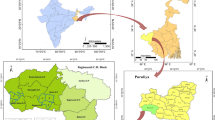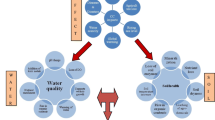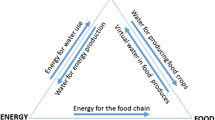Abstract
Climate change and a growing population around the Mediterranean Rim are increasing the need for water and, consequently, the pressure on resources in terms of both quantity and quality. High-quality water should be primarily reserved to drinking water while reclaimed water is an alternative for other usages. A review of situations in Tunisia, Jordan, France, and Italy involving the use of reclaimed water highlights the disparity in national regulations governing this alternative water resource and in its management. On the first hand, the use of recycled water for irrigation can have an adverse impact on public health and the environment, depending on treatment and irrigation practices. On the other hand, it may also represent a new source of water: wastewater should no longer be considered as waste but, rather, as a new resource to be handled in a circular economy-type loop. Current scientific knowledge in agronomic and environmental sciences, as well as in the economic and social sciences, can be integrated and used to lower the associated risk through the effective management of irrigation using recycled water and to address the following questions: (i) How can the time-varying nutrient needs of crops be managed to operate safe environmental reuse within an adapted risk assessment framework? (ii) What socio-economic models can render this integrated approach sustainable? (iii) What treatment systems and irrigation technology can be used to support these ideas and with what information? (iv) What changes in the regulations are needed?
Similar content being viewed by others
Notes
This practice refers to the use of non-conventional waters.
Abbreviated as CBA (see Online Resource 2)
“Feedback control” refers to the appropriate way of acting on a physical system—through actuators—to force certain output variables—usually observed via measurements—to follow predefined possibly, time-varying patterns called “setpoints.”
Abbreviated as LCA (see Online Resource 3)
References
Ayars JE, Bucks DA, Lamm FR, Nakayama FS (2007) Introduction. In: Lamm FR, Ayars JE, Nakayama FS (eds) Microirrigation for crop production design, operation, and management. Elsevier, Amsterdam, pp 1–26. https://doi.org/10.1016/S0167-4137(07)80004-7
Ayers RS, Westcot DW (1985) Water quality for agriculture. FAO Irrigation and Drainage Paper 29 (Rev. 1). Food and Agriculture Organization of the United Nations, Roma
Bahri A (2009) Managing the other side of the water cycle: making wastewater an asset. TEC background paper no 13. http://www.monroban.org/public/documents/outils/uploaded/5Asul4n6.pdf. Accessed 16 Jan 2018
Batarseh MI, Rawajfeh A, Ioannis KK, Prodromos KH (2011) Treated municipal wastewater irrigation impact on olive trees (Olea Europaea L.) at Al-Tafilah, Jordan. Water Air Soil Pollut 217(1-4):185–196. https://doi.org/10.1007/s11270-010-0578-7
Becerra Castro C, Lopes AR, Vaz-Moreira I, Silva EF, Manaia CM, Nunes OC (2015) Wastewater reuse in irrigation: a microbiological perspective on implications in soil fertility and human and environmental health. Environ Int 75:117–135. https://doi.org/10.1016/j.envint.2014.11.001
Ben Brahim-Neji H, Ruiz-Villaverde A, González-Gómez F (2014) Decision aid supports for evaluating agricultural water reuse practices in Tunisia: the Cebala perimeter. Agric Water Manag 143:113–121. https://doi.org/10.1016/j.agwat.2014.07.002
Bond WJ (1999) Effluent irrigation—an environmental challenge for soil science. Aust J Soil Res 4(4):543–555. https://doi.org/10.1071/S98017
Bounoua S (2010) Etude du colmatage des systèmes d’irrigation localisée. Dissertation (In French), University of Provence Aix-Marseille I
Carpa A, Scicolone B (1998) Water quality and distribution uniformity in drip/trickle irrigation systems. J Agr Eng Res 70(4):355–365. https://doi.org/10.1006/jaer.1998.0287
Condom N, Lefebvre M, Vandome L (2012) Treated wastewater reuse in the Mediterranean: lessons learned and tools for project development. Plan Bleu, Valbonne
Decree of the Ministry of Environment 185 (2003) Italian Legislation. Legge quadro sulle acque D. Legs 152/99; Decreto n°185
Devkota B, Schmidt GH (2000) Accumulation of heavy metals in food plants and grasshoppers from the Taigetos Mountains, Greece. Agric Ecosyst Environ 78(1):85–91. https://doi.org/10.1016/S0167-8809(99)00110-3
Drechsel P, Scott CA, Raschid-Sally L, Redwood M, Bahri A (2010) Wastewater irrigation and health-assessing and mitigating risk in low-income countries. IWMI, IDRC, Earthscan, London
Dvarioniene J, Stasiskiene Z (2007) Integrated water resource management model for process industry in Lithuania. J Clean Prod 15(10):950–957. https://doi.org/10.1016/j.jclepro.2006.01.009
El Ayni F, Cherif S, Jrad A, Trabelsi-Ayadi M (2011) Impact of treated wastewater reuse on agriculture and aquifer recharge in a coastal area: Korba case study. Water Resour Res 25(9):2251–2265. https://doi.org/10.1007/s11269-011-9805-2
Fahrenfeld N, Ma Y, O’Brien M, Pruden A (2013) Reclaimed water as a reservoir of antibiotic resistance genes: distribution system and irrigation implications. Front Microbiol 4-130:1–10. https://doi.org/10.3389/fmicb.2013.00130
French Regulation (2010) Arrêté du 02/08/10 relatif à l’utilisation d’eaux issues du traitement d’épuration des eaux résiduaires urbaines pour l’irrigation de cultures ou d’espaces verts. https://www.legifrance.gouv.fr/affichTexte.do?cidTexte=JORFTEXT000022753522. Accessed 16 Jan 2018
Frost HL, Ketchum LH (2000) Trace metal concentration in durum wheat from application of sewage sludge and commercial fertilizer. Adv Environ Res 4(4):347–355. https://doi.org/10.1016/S1093-0191(00)00035-6
Gajardo P, Harmand J, Ramirez H, Rapaport A (2011) Minimal-time bioremediation of natural water resources. Automatica 47(8):1764–1769. https://doi.org/10.1016/j.automatica.2011.03.001
Gamri S, Soric A, Tomas S, Molle B, Roche N (2014) Biofilm development in micro-irrigation emitters distributing treated wastewater for reuse. J Irrig Sci 32(1):77–85. https://doi.org/10.1007/s00271-013-0414-0
Gliessman SR (2006) Agroecology: the ecology of sustainable food systems, Second edn. CRC press, Boca Raton
Houdret A (2012) The water connection: irrigation and politics in southern Morocco. Water Alternatives 5:284–303
INNORPI (1989) Use of reclaimed water for agricultural purposes-Physical, chemical and biological specifications (in French), Tunisian standards. http://www.innorpi.tn/Fra/. Accessed 16 Jan 2018
IWA (2000) Activated sludge models. The IWA Task Group on Mathematical Modelling for Design and Operation of Biological Wastewater Treatment. IWA publishing, London
IWMI (1998) Global water scarcity study http://www.iwmi.cgiar.org/About_IWMI/Strategic_Documents/Annual_Reports/1998/WSacarcity. Accessed 16 Jan 2018
IWMI (2007) Agricultural use of marginal-quality water-opportunities and challenges. http://www.iwmi.cgiar.org/assessment/Water%20for%20Food%20Water%20for%20Life/Chapters/Chapter%2011%20MQ%20Water.pdf. Accessed 16 Jan 2018
Jhansi SC, Mishra SK (2013) Wastewater treatment and reuse: sustainability options. Consilience: J Sustain Dev 10:1–15. https://doi.org/10.7916/D8JQ10Q1
Jimenez B, Asano T (2008) Acknowledge all approaches: the global outlook on reuse. Water 21:32–37
Katebi R, Johnson MA, Wilkie J (1999) Control and instrumentation for waste water treatment plants, Series on Advances in Industrial Control. Springer, London. https://doi.org/10.1007/978-1-4471-0423-0
Kellis M, Kalavrouziotis IK, Gikas P (2013) Review of wastewater reuse in the Mediterranean countries, focusing on regulations and policies for municipal and industrial applications. Glob Nest J 15:333–350
Khan S, Cao Q, Zheng YM, Huang YZ, Zhu YG (2008) Health risks of heavy metals in contaminated soils and food crops irrigated with wastewater in Beijing, China. Environ Pollut 152(3):686–692. https://doi.org/10.1016/j.envpol.2007.06.056
Kihila J, Mtei KM, Njau KN (2014) Wastewater treatment for reuse in urban agriculture; the case of Moshi Municipality, Tanzania. Phys Chem Earth 72:104–110. https://doi.org/10.1016/j.pce.2014.10.004
Kukul YS, Çalışkan ADÜ, Süer ANAÇ (2007) Arıtılmış atık suların tarımda kullanılması ve insan sağlığı yönünden riskler. Ege Üniv Ziraat Fak Derg 44:101–116
Laera G, Cassano D, Lopez A, Pinto A, Pollice A, Ricco G, Mascolo G (2012) Removal of organics and degradation products from industrial wastewater by a membrane bioreactor integrated with ozone or UV/H2O2 treatment. Environ Sci Technol 46(2):1010–1018. https://doi.org/10.1021/es202707w
Lal R (2004) Soil carbon sequestration impacts on global climate change and food security. Science 304(5677):162–1627. https://doi.org/10.1126/science.1097396
Lamm FR, Camp CR (2007) Subsurface drip irrigation. In: Lamm FR, Ayars JE, Nakayama FS (eds) Microirrigation for crop production design, operation, and management. Elsevier, Amsterdam, pp 473–551. https://doi.org/10.1016/S0167-4137(07)80016-3
Lazarova V, Asano T, Bahri A, Anderson J (2013) Milestones in water reuse, the best success story. IWA Publishing, London
Lazrova V, Bahri A (2005) Water reuse for irrigation. CRC press, Boca Raton
Lonigro A, Montemurro N, Rubino P, Vergine P, Pollice A (2015) Reuse of treated municipal wastewater for irrigation in Apulia region: the “IN.TE.R.R.A.” project. Envir Sci Policy J 14:1665–1674
Lopez A, Pollice A, Lonigro A, Masi S, Palese AM, Cirelli GL, Toscano A, Passino R (2006) Agricultural wastewater reuse in southern Italy. Desalination 187(1-3):323–334. https://doi.org/10.1016/j.desal.2005.04.091
Luquet D, Vidal A, Smith M, Dauzat J (2005) ‘More crop per drop’: how to make it acceptable for farmers? Agric Water Manag 73(2):108–119. https://doi.org/10.1016/j.agwat.2005.01.011
Mascolo G, Balest L, Cassano D, Laera G, Lopez A, Pollice A, Salerno C (2010) Biodegradability of pharmaceutical industrial wastewater and formation of recalcitrant organic compounds during aerobic biological treatment. Bioresour Technol 101(8):2585–2591. https://doi.org/10.1016/j.biortech.2009.10.057
MED WWR WWG (2007) Mediterranean wastewater reuse group. Mediterranean Wastewater Reuse Report. EU water initiative,WFD process. http://ec.europa.eu/environment/water/blueprint/pdf/med_final_report.pdf. Accessed 16 Jan 2018
Michael I, Rizzo L, McArdell CS, Manaia CM, Merlin C, Schwarz T, Dagot C, Fatta-Kassinos D (2013) Urban wastewater treatment plants as hotspots for the release of antibiotics in the environment: a review. Water Res 47(3):957–995. https://doi.org/10.1016/j.watres.2012.11.027
Ministry of Water and Irrigation (MWI) (2015) National framework for decentralized wastewater management. Amman, Jordan
Ministry of Water and Irrigation in Jordan (MWI) (2016) National Water Strategy 2016–2025. http://www.mwi.gov.jo/sites/en-us/Hot%20Issues/Strategic%20Documents%20of%20%20The%20Water%20Sector/National%20Water%20Strategy(%202016-2025)-25.2.2016.pdf. Accessed 16 Jan 2018
Mizyed NR (2013) Challenges to treated wastewater reuse in arid and semi-arid areas. Environ Sci Pol 25:186–195. https://doi.org/10.1016/j.envsci.2012.10.016
Molle B, Brelle F, Bessy J, Gantel D (2012) Which water quality for which uses? Overcoming overzealous use of the precautionary principle to reclaim waste water for appropriate irrigation uses. Irrig Drain 61:87–94. https://doi.org/10.1002/ird.1662
Molle B, Tomas S, Huet L, Audouard M, Olivier Y, Granier J (2016) Experimental approach to assessing aerosol dispersion of treated wastewater distributed via sprinkler irrigation. Irrig Drain Syst Eng 9
Nasr Abroug S (2014) Traitement et réutilisation des eaux uses traitées en Tunisie, ONAS. ONAS Rapport annuel
National Research Council (NRC) (1996) Use of reclaimed water and sludge in food crop production. National Academy Press, Washington D.C
Plan Bleu (2012) Water and climate change: which adaptation strategy for the Mediterranean?. Plan Bleu, Valbonne, Blue Plan Notes 23
Pollice A, Laera G, Cassano D, Diomede S, Pinto A, Lopez A, Mascolo G (2012) Removal of nalidixic acid and its degradation products by an integrated MBR-ozonation system. J Hazardous Mat 203-204:46–52. https://doi.org/10.1016/j.jhazmat.2011.11.072
Rapaport A, Rousseau, Harmand J (2014) Procédé de traitement d'une ressource fluide, programme d'ordinateur et module de traitement associes, BREVET INTERNATIONAL. https://hal.inria.fr/hal-00859584. Accessed 16 Jan 2018
Rizk N, Ait-Mouheb N, Bourrié G, Molle B, Roche N (2017) Parameters controlling chemical deposits in micro-irrigation with treated wastewater. J Water Supply Res T 66(8):587–597. https://doi.org/10.2166/aqua.2017.065
Rizzo L, Manaia C, Merlin C, Schwartz T, Dagot C, Ploy MC, Michael I, Fatta Kassinos D (2013) Urban wastewater treatment plants as hotspots for antibiotic resistant bacteria and genes spread into the environment: a review. Sci Total Environ 447:345–360. https://doi.org/10.1016/j.scitotenv.2013.01.032
Thebo AL, Drechsel P, Lambin EF, Nelson KL (2017) A global, spatially-explicit assessment of irrigated croplands influenced by urban wastewater flows. Environ Res Lett 12(7). https://doi.org/10.1088/1748-9326/aa75d1
TYPSA Consulting Engineers & Architects (2013) Updated report on wastewater reuse in the European Union. Service contract for the support to the follow-up of the Communication on Water scarcity and Droughts. April 2013. TYPSA-reference: 7452-IE-ST03_WReuse_Report-Ed1.doc, http://ec.europa.eu/environment/water/blueprint/pdf/Final%20Report_Water%20Reuse_April%202013.pdf. Accessed 16 Jan 2018
UNWWDR (2017) UN-World Water Development Report, Wastewater the Untapped resource. http://www.unesco.org/new/en/natural-sciences/environment/water/wwap/wwdr/. Accessed 16 Jan 2018
Vergine P, Saliba R, Salerno C, Laera G, Berardi G, Pollice A (2015) Fate of the fecal indicator Escherichia coli in irrigation with partially treated wastewater. Water Res 85:66–73. https://doi.org/10.1016/j.watres.2015.08.001
Vergine P, Lonigro A, Salerno C, Rubino P, Berardi G, Pollice A (2016) Nutrient recovery and crop yield enhancement in irrigation with reclaimed wastewater: a case study. Urban Water J 14(3):325–330. https://doi.org/10.1080/1573062X.2016.1141224
Verlicchi P, Aukidy MA, Zambello E (2012) Occurrence of pharmaceutical compounds in urban wastewater: removal, mass load and environmental risk after a secondary treatment—a review. Sci Total Environ 429:123–155. https://doi.org/10.1016/j.scitotenv.2012.04.028
Winpenny JT (1997) Demand management for efficient and equitable use. In: Kay M, Franks T, Smith L (eds) Water: economics, management and demand. EFN Spon, London, pp 296–303
World Bank (2010) Improving wastewater use in agriculture. The World Bank- ETWWA. http://siteresources.worldbank.org/INTWAT/Resources/ESWWastewaterAg.pdf. Accessed 16 Jan 2018
World Health Organization (1989) Health guidelines for the use of wastewater in agriculture and aquaculture, Report of a WHO Scientific Group. WHO Technical report series 778. World Health Organization, Geneva
Yang Y, Li B, Zou S, Fang HHP, Zhang T (2014) Fate of antibiotic resistance genes in sewage treatment plant revealed by metagenomic approach. Water Res 62:97–106. https://doi.org/10.1016/j.watres.2014.05.019
Yokokawa K, Namba R, Yamanaka O, Kurokawa F, Yamagata H (2013) Model based optimal control for SWRO process based on pilot plant data. IDA J Desalin Water Reuse 5(2):83–90. https://doi.org/10.1179/2051645213Y.0000000010
Funding
The authors thank for their financial support the SICMED Mediterranean research network (http://www.sicmed.net/), the TREASURE research network (https://project.inria.fr/treasure/), the UTIQUE project 2013 No. 28687SF “Ecologie microbienne et modélisation pour le traitement de l’eau,” the TASSILI project 2015 No. 33254QH “Procédés membranaires pour le traitement anaérobie des eaux usées—Modélisation, commande et optimisation,” the Water4Crops FP7 project, “Integrating bio-TWW with enhanced water use efficiency to support the Green Economy in EU and India,” No. 311933, the Mad4Water EU Horizon 2020 project, “Development And application of integrated technological and management solutions for wastewater treatment and efficient reuse in agriculture tailored to the needs of Mediterranean African Countries,” and the NOWWMA project, “New Process for Optimizing Wastewater Reuse from Mauguio to the Mediterranean Area” in support of the French Reuse Directive.
Author information
Authors and Affiliations
Corresponding author
Electronic supplementary material
ESM 1
(DOCX 26 kb)
Rights and permissions
About this article
Cite this article
Ait-Mouheb, N., Bahri, A., Thayer, B.B. et al. The reuse of reclaimed water for irrigation around the Mediterranean Rim: a step towards a more virtuous cycle?. Reg Environ Change 18, 693–705 (2018). https://doi.org/10.1007/s10113-018-1292-z
Received:
Accepted:
Published:
Issue Date:
DOI: https://doi.org/10.1007/s10113-018-1292-z




